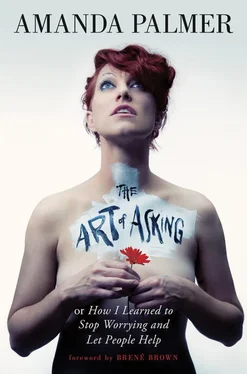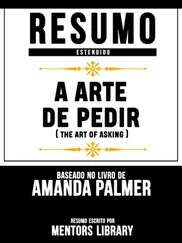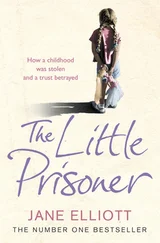Fine, I’ll write it , I said, crossing my arms. And I’m putting EVERYTHING in it. And then everyone will know what an asshole I truly am for having a best-selling novelist husband who covered my ass while I waited for the check to clear while writing the ridiculous self-absorbed nonfiction book about how you should be able to take help from everybody .
You realize you’re a walking contradiction, right? he asked.
So? I contain multitudes. Can’t you just let me cling to my own misery?
He looked at me.
Sure, darling. If that’s what you want .
I stood there, fuming.
He sighed. I love you, miserable wife. Would you like to go out to dinner to maybe celebrate your book deal?
NO! I DON’T WANT TO CELEBRATE. IT’S ALL MEANINGLESS! DON’T YOU SEE?
I give up , he said, and walked out of the room.
GOOD! I shouted after him. YOU SHOULD GIVE UP! THIS IS A HOPELESS FUCKING SITUATION! I AM A TOTALLY WORTHLESS FRAUD AND THIS BOOK DEAL PROVES IT .
Darling , he called from the other room, are you maybe expecting your period?
NO. MAYBE. I DON’T KNOW! DON’T EVEN FUCKING ASK ME THAT. GOD .
Just checking , he said.
I got my period a few days later.
I really hate him sometimes.
• • •
Seeing each other is hard.
But I think when we truly see each other, we want to help each other.
I think human beings are fundamentally generous, but our instinct to be generous gets broken down.
The Bride taught me more than I realized, and I still learn from her.
Sometimes people would only toss a penny into my hat. I’d still always give them a flower. That was the rule. Sometimes I used the flowers to thank people for helping me: the value was not fixed by outside entities.
The flower always had a value, but it was never an absolute value; sometimes it was a twenty-dollar flower, and sometimes it was a free flower. But it was always a gift.
The money was a gift. And the flower was a gift.
And often, though it had already been paid for, be it with a quarter or a five-dollar-bill, the value of the flower would increase the moment I handed it over to its buyer—and as we held each other’s gaze, I could feel the value rising, like an emotional stock ticker. The value of the gift rises in transit, as it is passed from hand to hand, from heart to heart. It gains its value in the giving, and in the taking. In the passage.
When I became a musician, the music worked the same way. Once I allowed people to share the songs, and there was no fixed price enforced by the label (or the store, or any other broker), things changed. People trusted me, and one another, more than before.
I kept faith. Giving away free content, for me, was about the value of the music becoming the connection itself .
It was about the value coming from the taker of the flower, the hearer of the song, the heart of the beholder. Being painted white and standing on a box, the crowdsurfing, the Kickstarter, ringing a stranger’s doorbell in the middle of the night: I no longer see these things as risk. I see them as acts of trust.
I think the real risk is the choice to disconnect. To be afraid of one another.
We make countless choices every day whether to ask or to turn away from one another. Wondering whether it’s too much to ask the neighbor to feed the cat. The decision to turn away from a partner, to turn off the light instead of asking what’s wrong.
Asking for help requires authenticity, and vulnerability.
Those who ask without fear learn to say two things, with or without words, to those they are facing:
I deserve to ask
and
You are welcome to say no .
Because the ask that is conditional cannot be a gift.
• • •
How do we create a world in which people don’t think of art just as a product , but as a relationship ?
As art returns to the commons and becomes more and more digital, uncaged, freely shareable, we need to figure out how people can sustain a new artistic ecosystem. The Internet is wonderful, and crowdfunding has opened up new worlds of possibility. There are terrific new tools, but they’re only tools. They’ll improve, they’ll go away, they’ll evolve, but even the perfect tools aren’t going to help us if we can’t face one another. If we can’t see one another.
The entertainment industry, reflecting the world at large, has been obsessed with the wrong question: how do we MAKE people pay for content? What if we started thinking about it the other way around: how do we LET people pay for content?
The first question is about FORCE.
The second is about TRUST.
This isn’t just about music.
It’s about everything .
It’s hard enough to give fearlessly, and it’s even harder to receive fearlessly.
But within that exchange lies the hardest thing of all:
To ask. Without shame.
And to accept the help that people offer.
Not to force them.
Just to let them.
• • •
I decided to go to Australia to write the first draft of this book all in one breathless, two-month marathon. Neil was planning to come for the first three weeks, but the book deadline was barrelling towards me, and he saw the terror in my eyes. I had no idea how I was going to juggle being with Neil for three weeks while simultaneously turning myself into a book monk who did nothing but write for ten hours a day. We had tried getting things done together while being in the same space and failed miserably—and this was an extreme case.
I can tell you’re freaking out , Neil said, about a month before the trip. I’m not going to come. Just go write your book. If anyone understands a writer’s need to tell everybody to sod off, it’s me .
You’re serious? It means we won’t see each other for almost three months .
I’m serious. All I ask is that you make me feel loved and reassured. You’re not always good at that. In fact, you were terrible at it when you were making your record there two years ago .
Was I really that bad?
Yes, darling. You were awful. You went days without texting, weeks without calling. Then again, I took all that time and wrote a really good book .
Right? But to be fair, I’d warned you , I argued. I told you I was going to disappear into my recording cave .
He looked at me and said nothing.
I felt like such a selfish failure of a human being. A Bad Wife.
I’ll try harder this time , I said.
• • •
Ben Folds, a piano-slaying, songwriting friend of mine, wrote a song called “Free Coffee” about the irony of being showered with certain kinds of help once you don’t need it as much. It’s a kind of Murphy’s Law. Let’s call it Ben’s Law: Once you’re a well-known artist who can afford to buy coffee, some percentage of the independent coffee shops you walk into will be staffed by a fan who will offer you free coffee. You will want to scream, I DON’T NEED FREE COFFEE! I CAN FINALLY AFFORD COFFEE, I COULD EVEN BUY LIKE TWO HUNDRED COFFEES AND NOT FEEL THE FINANCIAL STING or NOW? NOWYOU OFFER ME FREE COFFEE? And you will realize you’re staring down the barrel of your past, being offered free coffee by a previous incarnation of your barista self, the one who worked at Toscanini’s and had $26 in her bank account. And you will look at yourself and remember how you used to give free coffee to the people you admired and liked, to your friends, to your family, to the old professor of yours who walked into the shop and barely recognized you.
Читать дальше












